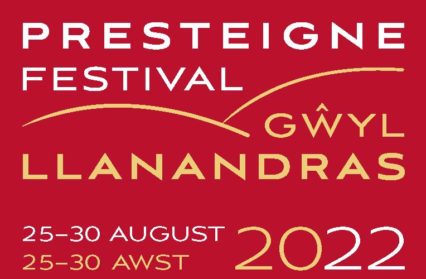David Truslove visited the Welsh border town of Presteigne on 29th and 30th August 2022 to hear three well contrasted programmes from St Andrew’s Church, as part of the Presteigne Festival 2022.
There’s no doubt about it, for those with a sense of enquiry, the Presteigne Festival offers a remarkable range of cultural events. Not least is a commitment to contemporary music, always audience-friendly even if some of the composers, who might be on the first rung of their career ladder, are unfamiliar names. Now in its fortieth year, the Festival’s spirit of enterprise remains a distinguishing hallmark, owing much to the energy and talent of George Vass who has just clocked up 30 years as artistic director. This year alone he has added another ten world premieres to Presteigne’s expanding portfolio.
I caught two of these on the penultimate evening of the Festival at St Andrew’s Church where the Leonore Piano Trio gave the premieres of Huw Watkins’ Piano Trio No. 2 and Ninfea Cruttwell-Reade’s work for violin and piano Bewegt. The latter – taking its title from the German musical term for animated – took the form of a series of ‘electrical’ shocks, rhythmically punchy and dance-like, its brief span holding the ear as much for its startling animation as for its vigorous performance by violinist Benjamin Nabarro and pianist Tim Horton. Earlier, Watkins’ Piano Trio had made an arresting concert opener, with four skilfully linked movements that traversed an absorbing emotional journey within a romantic sensibility, and where no material was wasted or overworked. A wonderful piece that should be taken up by other chamber musicians. In between, Gemma Rosefield gave a rapt performance of Joseph Phibbs’ multi-movement Cello Sonata (2021), teasing out its serenity and trauma with beguiling tone. However, the evening was crowned by an immaculately balanced account of Ravel’s Piano Trio, marked by an expressive range that variously confided and sparkled, its tender pianissimos making you hold your breath. Intelligent playing such as this was nowhere better demonstrated than in this revelatory performance.
There was much to admire the following afternoon in Tim Horton’s solo piano recital which featured three memorial pieces written by friends and former pupils of the composer Hugh Wood who had died in August 2021. Nostalgia coloured Thomas Hyde’s charming Cantilena, restraint occupied David Matthews’s well-crafted A Fugue for Hugh and gentle searching gestures brought an elegiac quality to Francis Pott’s A Sort of Rainbow, the whole played with Horton’s customary polish and attention to detail. His crystalline tone wrapped itself around Julian Phibbs’ Desdemona-inspired Barcarola, a work of accumulating interest where rumination, unrest and quietly uncertain resolution were underpinned by figurative patterns that never outstayed their welcome.
The recital was bookended by two representatives of the First and Second Viennese School; Arnold Schoenberg’s epigrammatic Six Little Pieces, Op. 19, were given involving renditions with bone china delicacy to the fore, while Schubert’s no less visionary or experimental Drei Klavierstücke (D946) from 1828 gave the Fazioli grand a solid workout. The work’s feverish momentum, introspection and serenity were fully realised in a performance that seemed to echo the words of Robert Schumann who once remarked of Schubert ‘He has sounds to express the most delicate of feelings, of thoughts, indeed even for the events and conditions of human life’.

Delicate feelings mostly percolated through the Festival’s closing concert, a century of new, recent and established British music enlivened by the presence of two of its contributing composers and the Presteigne Festival Orchestra under the reliable baton of George Vass. Benjamin Nabarro’s violin lent eloquence to an otherwise emphatic account of Ralph Vaughan Williams’ Violin Concerto in D minor, its poetic central movement providing relief from a little too much pesante in the outer movements. A more yielding account was given of Gerald Finzi’s Three Soliloquies from ‘Love’s Labour’s Lost’, Vass coaxing heart-easing playing with spot-on woodwind cameos. Central to this gala programme was the world premiere of Tarik O’Regan’s three movement concerto for soprano saxophone and string orchestra, entitled Machine. Soloist Amy Dickson brought considerable artistry to this overlong work, but her flawless intonation and fabulous breath control did little to temper the work’s rhetoric or its sepia tinted demeanour.
Darker colours emerged in the atmospheric Trallali, Trallaley, Trallalera written by senior winner of the BBC Young Composer 2017 Sarah Frances Jenkins. Scored for large chamber ensemble, her work explores the relationship between the natural world and the duties of a soldier, an idea influenced by the songs inherent to Mahler’s Das Knaben Wunderhorn. Unfolding from shards of clarinet, trumpet and piano above tremolo strings, Jenkins creates a brooding tableau, its military overtones mocking the work’s title. By sharp contrast, Julian Philips’ vibrant Divertissement, a concert suite filleted from a 2004 ballet score, formed an ideal Festival finale by this Cardiff-born composer and this year’s composer-in-residence. With echoes of the French Baroque, explicitly referencing Jean Philippe Rameau, Philips’ dance-based score formed a mélange of moods and ear-catching sonorities, its pageantry played with unmistakable joie de vivre by the Presteigne Festival Orchestra. What better way to celebrate 40 years!
Presteigne Festival 2022 | 40th Anniversary Festival











